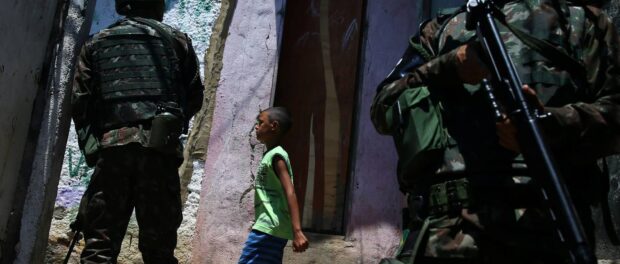
For the original article in Portuguese by Edu Carvalho published by Nexo Jornal click here.
For my birthday, what I really wanted was something far beyond me: the chance for my cousins and their friends to grow up and to dream.
I’ve never been one to really enjoy my birthday. To be honest, it was never possible to have a big celebration because of our financial situation. The money for cake, brigadeiro, and soda was the same we’d need to pay for ground beef, pasta, and bread the next day. Priorities.
But in just a few days, I’ll be turning 21 and dancing to the 150 BPM music of Rennan da Penha against all the barbarity.
I feel much older. I get little sleep; I live in a state of constant alert. I’ve traveled miles between the country’s two largest cities: Rio and São Paulo. I’ve learned to be as frantic as Rocinha, the favela where I was raised and that encouraged me to take the courageous step I took three months ago: to temporarily move to another city.
Tracing the trajectory of my early life, there are many who could have gotten here with me. Iago, Cleiton… who had neither rights, nor opportunities. You don’t know them, but you’ve certainly seen similar stories on the evening news. Brazilian citizens, who, just like you, are considered “the future” but who are exterminated by a government that oppresses with all-but-stray bullets that are always heading in the same direction—towards black bodies. Now let me ask a problematic question: why?

“Why did you shoot me?’’ Those were the last words of 17-year-old Douglas Rodrigues, after being shot by a police officer in São Paulo three years ago. His family got their answer when the officer was acquitted on account of “insufficient evidence.’’ Apparently, weapons in Brazil have a life of their own. As soon as they get shaken up too much, shots are fired, right?
According to data from the ABRINQ Foundation broadcast via GloboNews, the number of black youth killed by firearms in Brazil has increased by 428% over the last 20 years. In the state of Rio alone, the disparity between black and white youth is shocking: blacks represented 78.1% of youth killed in 2017, while their white counterparts made up 21.2% of the total. In the city of São Paulo, the picture is “balanced”: 51.7% and 47.1%, respectively. [Note to readers: In Rio de Janeiro state, 52% declare themselves black or brown, and 47% white; in São Paulo city 37% declare themselves black or brown, 61% white.]
The study’s conclusion is anything but hopeful. “If this trend continues for the next few years, the data will get worse,” said Heloisa Oliveira, executive manager of ABRINQ. On the couch next to me, my mom was emphatic: “How sad.”
Over these 21 years, I’ve employed endless tricks and strategies to avoid becoming a statistic. It isn’t easy.
“I have to confess that I don’t do much, I’m bigger on luck,” responded a friend of mine when I asked how he stays alive as a young white man living in an upper-class neighborhood. Me, relying on luck? Never. Over these 21 years, I’ve employed endless tricks and strategies to avoid becoming a statistic. It isn’t easy. The “get down-get up-remain silent’’ choreography marked the early years of my childhood. After all, houses in the favelas aren’t bulletproof; shots pierce the walls. Recently, I decided that it would be better not to wear a backpack on days when there are shootouts in the favela. And of course, I only leave the house with my ID attached to my job badge.

What was I saying? Oh, yes, about turning 21. Well, really, I was talking about not dealing with birthdays very well; about traveling between two violent cities; about the genocide of the population to which I belong—that constitutes the majority of the Brazilian population; about the fact that nothing happens “by mistake” on a Sunday afternoon; about the prayers that I say to myself on the 539, a bus that circulates through Rio’s South Zone; and about the prayers that I say on the São Paulo metro.
That’s why, on May 6, I’m not all that interested in hearing “Happy Birthday.” What I really want is something far beyond me: the possibility for my cousins and their friends to grow up and to dream. My single greatest and most important achievement thus far is staying alive.
Edu Carvalho is a journalist, contributor to the Conversa com Bial program, and social activist from the favela of Rocinha.

